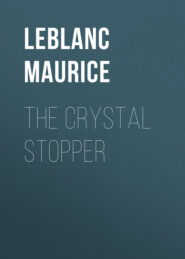По всем вопросам обращайтесь на: info@litportal.ru
(©) 2003-2025.
✖
813
Настройки чтения
Размер шрифта
Высота строк
Поля
He drove, without stopping, to the grand-duchy, which he reached at two o'clock. He had an interview with Count de Waldemar, whom he asked, upon some pretext, to delay the journey of the delegates of the Regency to Bruggen. Then he went in search of Doudeville, in a tavern at Veldenz.
Doudeville took him to another tavern, where he introduced him to a shabbily-dressed little gentleman, Herr Stockli, a clerk in the department of births, deaths and marriages. They had a long conversation. They went out together and all three passed stealthily through the offices of the town-hall. At seven o'clock, Lupin dined and set out again. At ten o'clock he arrived at Bruggen Castle and asked for Geneviève, so that she might take him to Mrs. Kesselbach's room.
He was told that Mlle. Ernemont had been summoned back to Paris by a telegram from her grandmother.
"Ah!" he said. "Could I see Mrs. Kesselbach?"
"Mrs. Kesselbach went straight to bed after dinner. She is sure to be asleep."
"No, I saw a light in her boudoir. She will see me."
He did not even wait for Mrs. Kesselbach to send out an answer. He walked into the boudoir almost upon the maid's heels, dismissed her and said to Dolores:
"I have to speak to you, madame, on an urgent matter… Forgive me.. I confess that my behavior must seem importunate… But you will understand, I am sure.."
He was greatly excited and did not seem much disposed to put off the explanation, especially as, before entering the room, he thought he heard a sound.
Yet Dolores was alone and lying down. And she said, in her tired voice:
"Perhaps we might.. to-morrow.."
He did not answer, suddenly struck by a smell that surprised him in that boudoir, a smell of tobacco. And, at once, he had the intuition, the certainty, that there was a man there, at the moment when he himself arrived, and that perhaps the man was there still, hidden somewhere..
Pierre Leduc? No, Pierre Leduc did not smoke. Then who?
Dolores murmured:
"Be quick, please."
"Yes, yes, but first.. would it be possible for you to tell me.. ?"
He interrupted himself. What was the use of asking her? If there were really a man in hiding, would she be likely to tell?
Then he made up his mind and, trying to overcome the sort of timid constraint that oppressed him at the sense of a strange presence, he said, in a very low voice, so that Dolores alone should hear:
"Listen, I have learnt something.. which I do not understand.. and which perplexes me greatly. You will answer me, will you not, Dolores?"
He spoke her name with great gentleness and as though he were trying to master her by the note of love and affection in his voice.
"What have you learnt?" she asked.
"The register of births at Veldenz contains three names which are those of the last descendants of the family of Malreich, which settled in Germany.."
"Yes, you have told me all that.."
"You remember, the first name is Raoul de Malreich, better known under his alias of Altenheim, the scoundrel, the swell hooligan, now dead.. murdered."
"Yes."
"Next comes Louis de Malreich, the monster, this one, the terrible murderer who will be beheaded in a few days from now."
"Yes."
"Then, lastly, Isilda, the mad daughter.."
"Yes."
"So all that is quite positive, is it not?"
"Yes."
"Well," said Lupin, leaning over her more closely than before, "I have just made an investigation which showed to me that the second of the three Christian names, or rather a part of the line on which it is written, has at some time or other, been subjected to erasure. The line is written over, in a new hand, with much fresher ink; but the writing below is not quite effaced, so that.."
"So that.. ?" asked Mrs. Kesselbach, in a low voice.
"So that, with a good lens and particularly with the special methods which I have at my disposal, I was able to revive some of the obliterated syllables and, without any possibility of a mistake, in all certainty, to reconstruct the old writing. I then found not Louis de Malreich, but."
"Oh, don't, don't!."
Suddenly shattered by the strain of her prolonged effort of resistance, she lay bent in two and, with her head in her hands, her shoulders shaken with convulsive sobs, she wept.
Lupin looked for long seconds at this weak and listless creature, so pitifully helpless. And he would have liked to stop, to cease the torturing questions which he was inflicting upon her. But was it not to save her that he was acting as he did? And, to save her, was it not necessary that he should know the truth, however painful?
He resumed:
"Why that forgery?"
"It was my husband," she stammered, "it was my husband who did it. With his fortune, he could do everything; and he bribed a junior clerk to have the Christian name of the second child altered for him on the register."
"The Christian name and the sex," said Lupin.
"Yes," she said.
"Then," he continued, "I am not mistaken: the original Christian name, the real one, was Dolores?"
"Yes."
"But why did your husband.. ?"
She whispered in a shame-faced manner, while the tears streamed down her cheeks.
"Don't you understand?"
"No."
"But think," she said, shuddering, "I was the sister of Isilda, the mad woman, the sister of Altenheim, the ruffian. My husband – or rather my affianced husband – would not have me remain that. He loved me. I loved him too, and I consented. He suppressed Dolores de Malreich on the register, he bought me other papers, another personality, another birth-certificate; and I was married in Holland under another maiden name, as Dolores Amonti."
Lupin reflected for a moment and said, thoughtfully:











